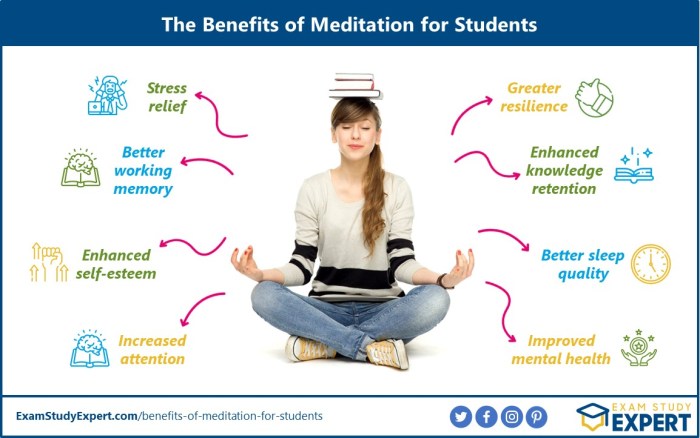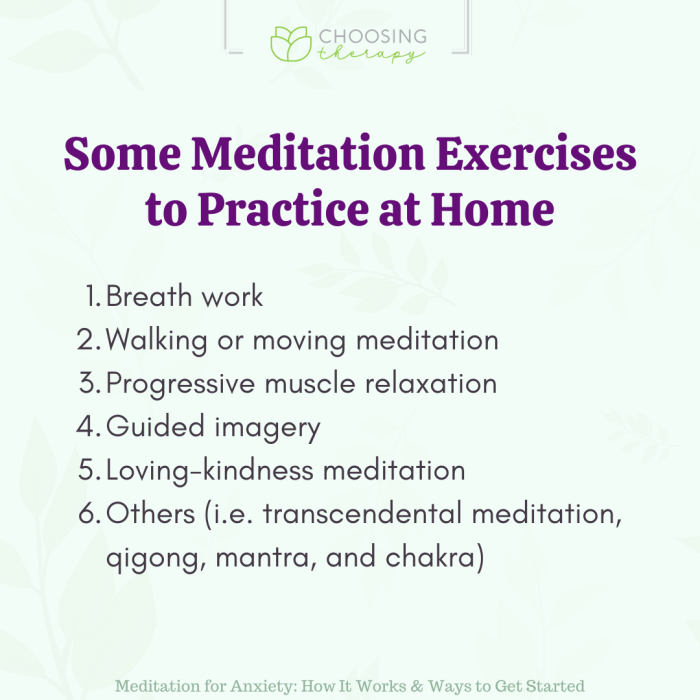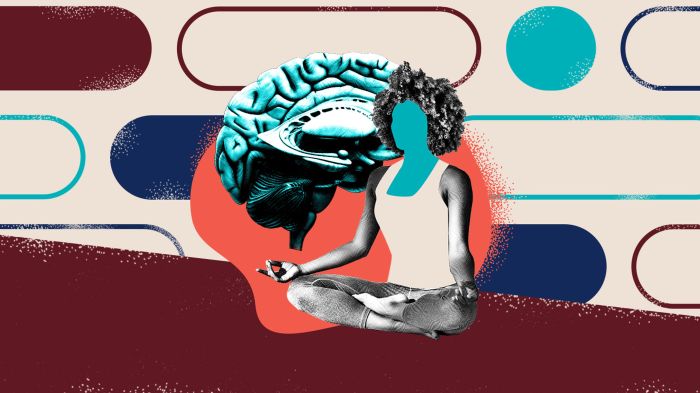How to Meditate for Releasing Mental Blockages sets the stage for this enthralling narrative, offering readers a glimpse into a story that is rich in detail with poetic language style and brimming with originality from the outset.
Embark on a journey of self-discovery as we delve into the transformative power of meditation in overcoming mental hurdles and unlocking inner harmony.
Introduction to Meditation for Releasing Mental Blockages

Mental blockages are obstacles that hinder our ability to think clearly, make decisions, or express ourselves fully. These blockages can stem from stress, anxiety, past traumas, or negative thought patterns. Meditation is a powerful tool that can help release these mental blockages by promoting relaxation, mindfulness, and self-awareness.
Benefits of Meditation in Improving Mental Clarity and Emotional Well-being
- Meditation helps calm the mind and reduce stress, allowing for clearer thinking and improved focus.
- By practicing meditation regularly, individuals can develop a greater sense of emotional stability and resilience.
- Through meditation, one can cultivate a deeper understanding of their emotions and learn to respond to them in a more constructive manner.
Connection Between Mindfulness Practices and Overcoming Mental Obstacles
- Mindfulness practices, such as meditation, encourage individuals to stay present in the moment and observe their thoughts without judgment.
- This awareness allows individuals to identify and address negative thought patterns or emotional triggers that contribute to mental blockages.
- By practicing mindfulness regularly, individuals can develop the skills needed to navigate through mental obstacles with greater ease and clarity.
Types of Meditation Techniques for Releasing Mental Blockages: How To Meditate For Releasing Mental Blockages

When it comes to releasing mental blockages through meditation, there are various techniques that can be employed to address specific obstacles. Each meditation practice offers a unique approach to clearing the mind and promoting mental clarity.
For those interested in meditating with their eyes open, here are 5 easy ways to do so in a mindful manner: How to Meditate with Eyes Open: 5 Easy Ways. These techniques can help you stay present and focused during your practice.
Mindfulness Meditation
Mindfulness meditation involves focusing on the present moment without judgment. By observing thoughts and emotions as they arise, individuals can develop a greater awareness of their mental patterns and learn to let go of negative thought cycles.
- Practice: Sit comfortably and bring your attention to your breath. Notice any thoughts or feelings that arise without getting caught up in them. Return your focus to the breath whenever you get distracted.
- Benefit: Mindfulness meditation helps individuals recognize and release mental blockages by cultivating a non-reactive awareness of their internal experiences.
Loving-Kindness Meditation
Loving-kindness meditation involves directing positive thoughts and feelings towards oneself and others. By generating feelings of love and compassion, individuals can dissolve barriers created by self-criticism and negativity.
Looking to heal from trauma through meditation? Explore the benefits and techniques in How to Meditate for Healing from Trauma. This guide offers a gentle approach to using meditation as a tool for healing and self-discovery.
- Practice: Start by sending loving-kindness wishes to yourself, then extend them to loved ones, acquaintances, and even difficult individuals. Repeat phrases like “May I be happy, may you be happy” with genuine intention.
- Benefit: Loving-kindness meditation helps individuals release mental blockages by fostering a sense of connection and empathy towards themselves and others.
Body Scan Meditation
Body scan meditation involves bringing attention to different parts of the body, noticing sensations, and releasing tension. By scanning the body systematically, individuals can identify and release physical and emotional blockages stored in different areas.
If you’re looking to release emotional blocks through meditation, check out this helpful guide on How to Meditate to Release Emotional Blocks. It provides step-by-step instructions on how to use meditation as a tool for emotional healing.
- Practice: Lie down or sit comfortably and slowly scan your body from head to toe. Notice any areas of tension or discomfort and breathe into them, allowing the tension to dissolve.
- Benefit: Body scan meditation helps individuals release mental blockages by promoting relaxation, awareness of bodily sensations, and the release of stored emotions.
Steps to Meditate for Releasing Mental Blockages

Meditation can be a powerful tool for releasing mental blockages and achieving mental clarity. Here is a step-by-step guide to help you start a meditation practice focused on releasing these blockages.
Preparation for Meditation
Before starting a meditation session to release mental blockages, it is essential to prepare a conducive environment. Find a quiet and comfortable space where you won’t be disturbed. Dim the lights, play soft music or use nature sounds, and consider lighting a candle or burning incense to create a calming atmosphere.
- A comfortable cushion or chair to sit on is necessary to ensure you can maintain a relaxed yet alert posture during meditation.
- Wearing loose and comfortable clothing can help you feel more at ease and relaxed during the meditation session.
- You may want to set a timer to ensure you meditate for a specific duration without the need to check the time constantly.
Focusing the Mind during Meditation
During meditation to release mental blockages, the key is to focus the mind and let go of distractions. Here are some tips on how to do this effectively:
- Start by taking deep breaths to center yourself and calm your mind. Focus on the sensation of your breath entering and leaving your body.
- Bring your awareness to the present moment by observing any thoughts or emotions that arise without judgment. Acknowledge them and let them pass without holding onto them.
- Visualize a bright light or energy flowing through your body, cleansing and releasing any mental blockages that may be present.
- Repeat a calming mantra or affirmation to reinforce positive thoughts and release negative energy from your mind.
- Stay focused on your breath and the present moment throughout the meditation session, allowing yourself to let go of any mental blockages that no longer serve you.
Mindful Breathing Techniques for Releasing Mental Blockages

Breathing is a fundamental aspect of meditation that can have a profound impact on releasing mental blockages. By practicing mindful breathing techniques, individuals can enhance their ability to focus, relax, and clear their minds of clutter.
The Importance of Mindful Breathing in Meditation, How to Meditate for Releasing Mental Blockages
- Mindful breathing helps individuals become more present and aware of their thoughts and emotions.
- It allows for a deeper connection between the mind and body, fostering a sense of calm and relaxation.
- By focusing on the breath, individuals can release tension and stress, creating space for mental blockages to dissolve.
Practicing Mindful Breathing Techniques Effectively
- Find a quiet and comfortable space to sit or lie down.
- Close your eyes and take slow, deep breaths, focusing on the sensation of air entering and leaving your body.
- Counting breaths or using a mantra can help maintain focus and prevent distractions.
- If your mind wanders, gently bring your attention back to the breath without judgment.
Impact of Deep Breathing Exercises on Mental Blockages
- Deep breathing exercises increase oxygen flow to the brain, promoting clarity of thought and reducing mental fog.
- By calming the nervous system, deep breathing can alleviate anxiety and allow for a more peaceful state of mind.
- Consistent practice of deep breathing can lead to long-term benefits, such as improved concentration and emotional stability.
As we conclude this exploration of meditation for releasing mental blockages, remember that the key to a peaceful mind lies within your willingness to embrace mindfulness and let go of inhibitions. Let your spirit soar freely as you navigate the realms of tranquility and self-awareness.